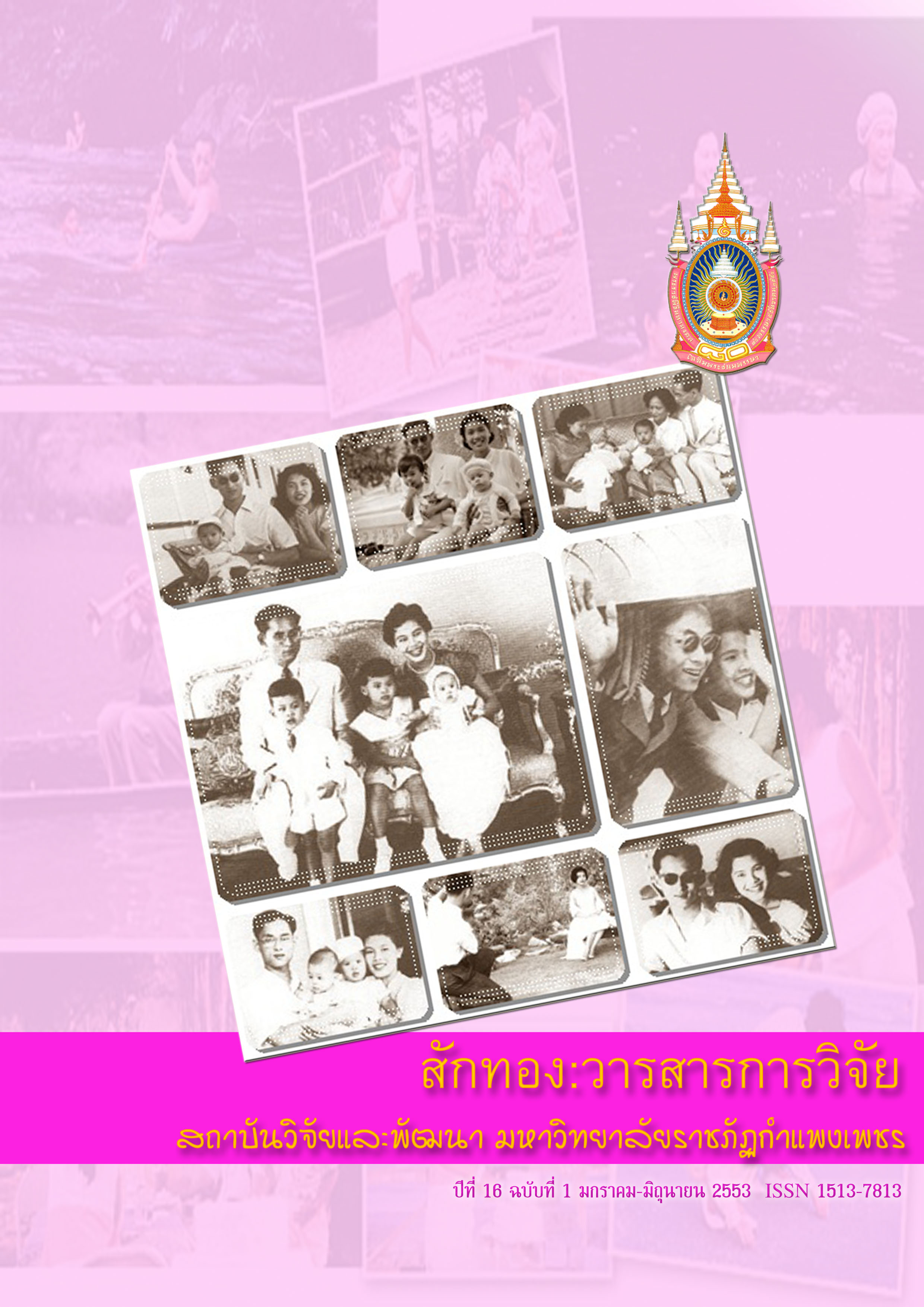การศึกษาและพัฒนาการแปรรูปเกษตรอินทรีย์ ของกลุ่มแม่บ้าน บ้านท่าศิลา อำเภอท่าตูม จังหวัดสุรินทร์ : ศึกษากรณีการทำข้าวหลาม
Main Article Content
Abstract
บทคัดย่อ
ภูมิปัญญาท้องถิ่นเรื่อง การศึกษาและพัฒนาการแปรรูปเกษตรอินทรีย์ ของกลุ่มแม่บ้าน บ้านท่าศิลา อำเภอท่าตูม จังหวัดสุรินทร์ : กรณีศึกษาการทำข้าวหลาม โดยมีวัตถุประสงค์เพื่อศึกษาประวัติศาสตร์ความเป็นมา และบริบทชุมชน บ้านท่าศิลา จังหวัดสุรินทร์ การศึกษาวิธีการถ่ายทอด การทำข้าวหลามจากอดีตจนถึงปัจจุบัน โดยการนำข้าวเกษตรอินทรีย์ และวัตถุดิบซึ่งเป็นผลผลิตมาจากธรรมชาติ และการพัฒนา การแปรรูป ข้าวหลามให้มีคุณภาพมากยิ่งขึ้น รสชาติอร่อยหอมหวานมัน การเลือกพื้นที่ในการศึกษาการทำข้าวหลามแบบเจาะจง กลุ่มตัวอย่างได้แก่ ผู้จำหน่ายข้าวหลาม จำนวน 10 ราย จากการศึกษา พบว่า การเผาข้าวหลามนั้น เป็นการรวมกลุ่มของแม่บ้าน โดยการถ่ายทอดภูมิปัญญาท้องถิ่น จากอดีตจนถึงปัจจุบัน จากการสัมภาษณ์ ผู้ที่ผลิตและจำหน่ายส่วนมากเป็นเพศหญิง มีอายุระหว่าง 35- 50 ปี มีรายได้เฉลี่ยต่อเดือน ประมาณ 10,000-25,000 บาท อาชีพหลักคือการทำนา ส่วนใหญ่ปลูกข้าวหอมมะลิ และข้าวเหนียว สำหรับการทำข้าวหลาม นั้นเป็นอาชีพเสริม ซึ่งสร้างชื่อเสียง และทำให้มีรายได้ มีเงินหมุนเวียนภายในหมู่บ้าน ประเภทของข้าวหลาม ที่ทำในขณะนี้มี 2 ประเภท ได้แก่ ข้าวหลามถั่วดำ ข้าวหลามใส่มะพร้าวอ่อน ชนิดของข้าวเหนียว ได้แก่ ข้าวเหนียวดำ และข้าวเหนียวขาว การประกอบอาชีพทำข้าวหลามนั้นถ่ายทอดมาเป็นเวลา 25 ปี โดยการถ่ายทอดจากบรรพบุรุษ ปราชญ์ชาวบ้าน เรียนรู้จากการจำในการทำอาชีพข้าวหลามเป็นอาชีพที่สร้างรายได้เสริมให้แก่ชุมชน จึงควรอนุรักษ์ไว้ เพื่อสืบทอดคนรุ่นต่อไป สูตรการทำข้าวหลามยังไม่มีการเปลี่ยนแปลง ยังคงเป็นแบบดั้งเดิม แต่จะมีการทดลองและพัฒนาต่อไป ความต้องการของกลุ่มผู้ผลิตข้าวหลามนั้น อยากให้หน่วยงานทางราชการเห็นความสำคัญและให้การสนับสนุน จากข้อสุดท้ายปัญหาและอุปสรรค พบว่า ปัญหาการทำข้าวหลาม คือ ต้นทุนการผลิตสูง การขาดแคลนวัตถุดิบ และปัญหาด้านเศรษฐกิจคำสำคัญ : การพัฒนาการแปรรูปเกษตรอินทรีย์, เกษตรอินทรีย์, ข้าวหลาม, บ้านท่าศิลา
ABSTRACT
Local wisdom in education and development in organic farm products of housewives’ group, Ban Thasila, Amphur Thatum, Surin : Case study in making Khao Larm.* The objective of the research was to study the background and the community of Ban Thasila. The researchers studied about how to make “Khao Larm” from the past to the present. Khao Larm was made of organic sticky rice and other natural ingredients and there was a development and another process to make Khao larm a better quality. The taste of Khao Larm is delicious, creamy and aromatic. The sampling population are random by specific sampling. The population of the Khao Larm makers are ten local people. The Khao Larm makers are ten local people. The Khao Larm makers are the group of the housewives who pass on the local wisdom from the past to the present. We interviewed the Khao Larm makers who are the housewives who are 35 - 50 years old. They can earn about 10,000 - 25,000 baht per month. The main occupation of these woman is farming. Most of them grow rice and the rice they grow in their farm is “Hom Mali Rice” and “Khao Niow” or sticky Rice. Khao Larm making is an additional income. This is a fame and an additional Support for financial circulation in the village. There are two kinds of Khao Larm making in this village. They are Khao Larm with black beans and Khao Larm with young coconuts. There two kinds of sticky rice which are black and white ones. Khao Larm making was passed on the generations for 25 years from their ancestors. Khao Larm making is an additional income for the community. It is worth preserving for the new generations. The recipe of Khao Larm making never changes. It is really traditional but there will be more experiments in making Khao Larm and to develop more. The need of Khao Larm makers is the support from the governmental organizations. The problems and the obstaclems and the obstacles of making Khao Larm is high capital and the lack of raw materials.
Key Word : Development in Organic Farm Products, Organic Farm, Khao Larm, Ban Thasila
Article Details
บทความที่ได้รับการตีพิมพ์เป็นลิขสิทธิ์ของวารสาร สักทอง : วารสารมนุษยศาสตร์และสังคมศาสตร์ สถาบันวิจัยและพัฒนา มหาวิทยาลับราชภัฏกำแพงเพชร
ข้อคิดเห็นใดๆ ที่ปรากฎในวารสารเป็นวรรณกรรมของผู้เขียนโดยเฉพาะ ซึ่งมหาวิทยาลัยราชภัฏกำแพงเพชรและบรรณาธิการไม่จำเป็นต้องเห็นด้วย


